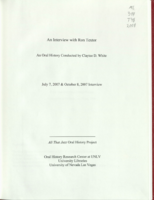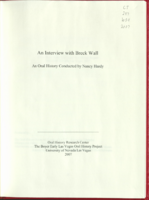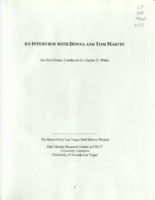Search the Special Collections and Archives Portal
Search Results

Howard Heckethorn interview, March 2, 1977: transcript
Date
Archival Collection
Description
On March 2, 1977, Neil C. Dalmas interviewed teacher Howard Heckethorn, (born on September 14th, 1922 in St. George, Utah) at Red Rock Elementary School in Las Vegas, Nevada. This interview offers an overview of early education in Nevada. Mr. Heckethorn also discusses Stewart Ranch, Howard Hughes and the Hughes Site, and the migration of the Mormons to the Las Vegas area.
Text

Transcript of interview with Dr. John Shepherd by Lisa Gioia-Acres, November 21, 2008
Date
Archival Collection
Description
Dr. John Richard Shepherd shares the background of his early life in southern Illinois, his father's and grandfather's occupations, and his educational journey through college and medical school. His army experiences in Chicago and Alabama convinced him and his wife to look for a warm dry climate in which to live, and they relocated to Las Vegas in 1968. Dr. Shepherd recalls the businesses and housing surrounding Sunrise Hospital, the difficulties getting his specialty listed in the phone book, and renting his first office space from Nate Adelson. He also describes taking out a loan to install ophthalmology equipment, hiring an office manager with medical accounting experience, and doing cataract surgery in a way that basically hadn't changed for decades. The passing of the Medicare bill back in 1966 caused Dr. Shepherd's practice to build up quickly. He details the many ways eye surgery changed, including the invention of the intraocular lens and the phacoemulsification procedure. He mentions his and Dr. Shearing's contributions to ophthalmology — better designed lenses and surgical techniques - which they taught to other doctors from all over the country. Dr. Shepherd discusses radial keratotomy, which was a precursor to laser and later LASIK surgery, and describes a lens implant technique he learned in Russia from Dr. Fyodorov. He goes on to share anecdotes and stories of his interactions with patients, his travels as a consultant and as a surgical teacher for Project Orbis, and meeting Fidel Castro. He speaks candidly about his successes and his failures as well. Dr. Shepherd retired in 2006 and immediately enrolled in a Master's program and earned a degree in military history. After a long and distinguished career, after receiving many accolades and awards, he and his wife are enjoying life, splitting their time between Sun Valley, Idaho, and Las Vegas.
Text

Transcript of interview with Ron Textor by Claytee White, July 24, 2007 & October 8, 2007
Date
Archival Collection
Description
Ron Textor grew up in Kirksvile, MO shortly after moved to Flint. MI; father was a doctor and mother a school teacher; started piano lessons at 5 and trombone at 8; attended classes at the Stan Kenton clinics at Michigan State University; National Stage Band Camp at Cleveland at the Western Reserve University; started own band at age 14 in Flint, MI; graduated high school in 1965; went to Central Michigan University graduated in 1969 with a bachelor's in music; 1972 released from the army and joined the Glenn Miller Orchestra under Buddy DeFranco; trumpet player Tom Snelson — Phantom of the Opera; The Airmen of Note; Colorado Springs Symphony Orchestra; recording at RCA Victor in Tokyo; 50 weeks a year of one-nighters; St Regis Roof in New York City; book by George Simon on Glenn Miller; Medina Ballroom; traveling by bus; rehearsal with Frank Sinatra; master's degree from Central Michigan; taught college at Michigan, Central, and Alma College; Mott Community College; moved to Wisconsin and taught at Mount Scenario College in the late 70 s; General Motors; Genesee County Fine Arts Council; CETA; Detroit Montreux Jazz Festival; 1981 Montreux Switzerland Jazz Festival; North Sea Jazz Festival at the Hague in Holland; move to Las Vegas 1981.
Text

Transcript of interview with Breck Wall by Claytee White, July 3, 2003
Date
Archival Collection
Description
Breck Wall grew up tough and honed that toughness into solid business acumen. He also grew up talented and that talent took him to movie sets in Los Angeles and allowed him to produce shows in Dallas, New York, Tahoe, and Las Vegas. Though his family became nonexistent early in his life, he formed his own broad family from a group of faithful friends around the country. One special friendship makes this interview worth reading — the one with Jack Ruby. Wall's talent though is the primary reason that this interview is good history. He did many shows and had up to five running simultaneously. The creative process was the fun part that allowed him to produce Passion , Alias, and Night Beat among many others. Bottoms Up is his signature production and has been at several venues in Las Vegas for the past 40 years. Breck Wall is living a full and interesting life. A good example is a phone call from The London Times'. "Mr. Wall?" 1 said, "Yes." He said, "Are you aware that your best friend, Jack Ruby, just shot Oswald?" I said, "What" I was in shock. I said, "No I'm not." And I talked to him very briefly,and I hung up the phone." The phone continued to ring as calls came in from the Dallas Morning News, The Washington Post, The New York Times, etc, etc.
Text

Transcript of interview with Tom and Donna Martin by Claytee White, January 31, 2013
Date
Archival Collection
Description
Hailing from Indiana and California, Donna Guiffre Martin and Tom Martin came to Las Vegas in the early 1950s as their parents sought new opportunities. Donna's father, Gus Guiffre, quickly established himself as a local television personality, while Tom's father took on a variety of entrepreneurial opportunities. Like many of the young people in Las Vegas, Donna and Tom enjoyed riding around town; horse-back riding; football games; Helldorado - and, of course, Rancho High School. This interview covers both Donna and Tom's early years before their moves to Las Vegas, as well as their memories of first homes, childhood experiences, early adulthood and their current lives.
Text

Ruby C. Leavitt interview, November 30, 1986: transcript
Date
Archival Collection
Description
On November 30, 1986, collector Patton Alberti interviewed Ruby Canonic Leavitt (born 1907 in Genoa, Nevada) at her home in Reno, Nevada. Mrs. Leavitt discusses her time as a teacher in Verdi, Nevada, as well as other places in Northern Nevada. She also discusses the changes she has seen in teaching and in the towns she has lived in over time.
Text

Interview with Joyce Anne (Reese) Parkhurst, November 27, 2004
Date
Archival Collection
Description
Text

Interview with Robert James Agonia, June 29, 2005
Date
Archival Collection
Description
Text

Interview with Robert Joseph Curran, July 19, 2005
Date
Archival Collection
Description
Text

Interview with Jacob "Chic" Hecht, May 11, 2004
Date
Archival Collection
Description
Text
